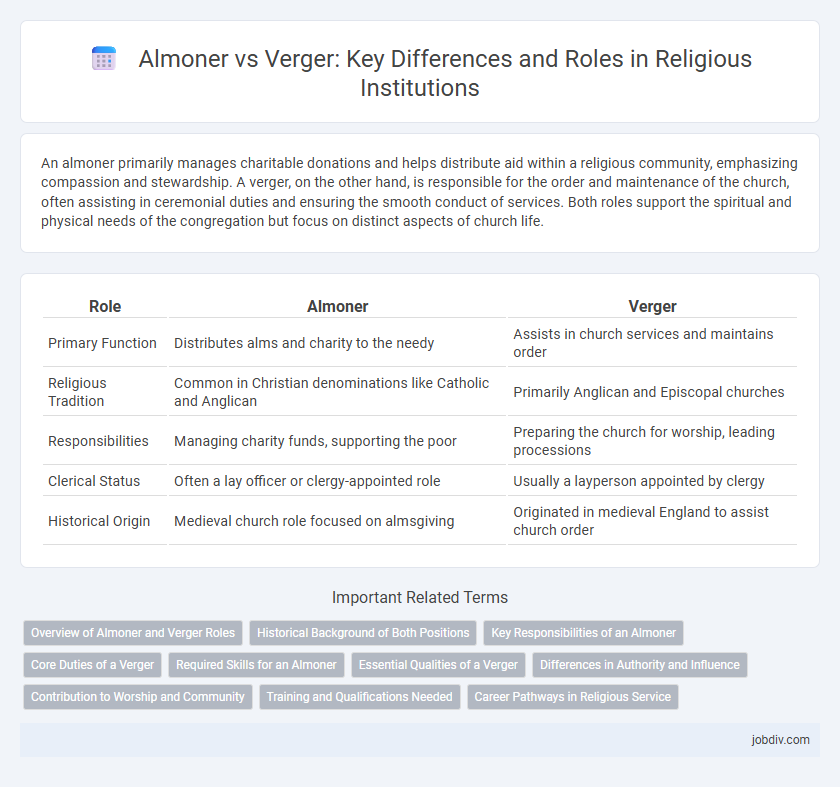An almoner primarily manages charitable donations and helps distribute aid within a religious community, emphasizing compassion and stewardship. A verger, on the other hand, is responsible for the order and maintenance of the church, often assisting in ceremonial duties and ensuring the smooth conduct of services. Both roles support the spiritual and physical needs of the congregation but focus on distinct aspects of church life.
Table of Comparison
| Role | Almoner | Verger |
|---|---|---|
| Primary Function | Distributes alms and charity to the needy | Assists in church services and maintains order |
| Religious Tradition | Common in Christian denominations like Catholic and Anglican | Primarily Anglican and Episcopal churches |
| Responsibilities | Managing charity funds, supporting the poor | Preparing the church for worship, leading processions |
| Clerical Status | Often a lay officer or clergy-appointed role | Usually a layperson appointed by clergy |
| Historical Origin | Medieval church role focused on almsgiving | Originated in medieval England to assist church order |
Overview of Almoner and Verger Roles
Almoners primarily manage charitable distributions and oversee the care of the needy within religious communities, ensuring funds and aid reach those in spiritual and material need. Vergers maintain order during worship services, assist clergy with liturgical ceremonies, and manage the physical space of the church to support smooth religious observances. Both roles are essential in supporting the functional and spiritual operations of ecclesiastical institutions.
Historical Background of Both Positions
The role of the almoner originated in medieval Christian churches as a designated official responsible for distributing alms and charity to the poor, reflecting the church's mission of social welfare. The verger's position emerged later in the Anglican tradition, dating back to the 16th century, where they served as caretakers and orderlies in church services, ensuring ceremonial order and processions ran smoothly. While both roles evolved within ecclesiastical settings, almoners focused predominantly on charitable functions, whereas vergers managed liturgical and administrative duties during worship.
Key Responsibilities of an Almoner
An Almoner is responsible for distributing alms and charitable aid to the needy within a religious community, often overseeing funds and resources designated for humanitarian purposes. They coordinate outreach programs, manage donations, and ensure that assistance reaches individuals and families requiring support. Unlike a Verger, who mainly handles ceremonial duties and church logistics, an Almoner's role centers on spiritual care through acts of charity and practical support.
Core Duties of a Verger
A verger's core duties include preparing the church for services, ensuring order during ceremonies, and assisting clergy with liturgical tasks. They oversee the maintenance of sacred spaces, guide processions, and help with the arrangement of vestments, books, and communion elements. Unlike an almoner, who manages charitable distributions, a verger's role is primarily focused on the smooth conduct and reverence of worship events.
Required Skills for an Almoner
An almoner requires strong interpersonal skills, compassion, and proficiency in managing charitable distributions within religious institutions. Expertise in administrative duties, record-keeping, and knowledge of community needs enhances their effectiveness in supporting the congregation. Familiarity with ecclesiastical protocols and the ability to liaise with clergy and parishioners are essential for fulfilling the almoner's role.
Essential Qualities of a Verger
A verger must possess strong organizational skills, a deep understanding of liturgical practices, and the ability to lead and support the clergy and congregation during religious services. Essential qualities include reliability, attention to detail, and a respectful demeanor that upholds the sanctity of the worship environment. Unlike an almoner, whose role centers on charitable outreach and assisting the poor, a verger's focus is on ceremonial order and maintaining the smooth conduct of church rituals.
Differences in Authority and Influence
An almoner primarily manages charitable distributions and has influence over philanthropic activities within a religious community, often acting as a liaison between clergy and the poor. A verger holds authority over the order and conduct of worship services, maintaining church property, and assisting clergy during ceremonies, thus influencing liturgical organization. The key difference lies in the almoner's role in social outreach versus the verger's focus on ecclesiastical order and ritual administration.
Contribution to Worship and Community
An Almoner primarily contributes by managing charitable distributions and supporting the welfare of the congregation, reinforcing community care through acts of kindness and financial aid. A Verger assists in the organization and smooth execution of worship services, ensuring liturgical order and solemnity during ceremonies. Both roles enhance the spiritual experience and communal harmony, with the Almoner focusing on outreach and compassion, and the Verger emphasizing worship facilitation and ceremonial structure.
Training and Qualifications Needed
Almoners typically require training in pastoral care, charity administration, and often hold qualifications in theology or social work to effectively support congregational needs. Vergers undergo specialized training in liturgy, church procedures, and ceremonial duties, often accredited by church authorities or religious organizations. Both roles demand a deep understanding of ecclesiastical traditions, but almoners emphasize compassionate outreach while vergers prioritize ceremonial order and maintenance of worship spaces.
Career Pathways in Religious Service
Almoners typically focus on charitable outreach and pastoral care within religious communities, often progressing through roles in social services or church administration. Vergers are responsible for the order and upkeep of church services and buildings, with career advancement possible into senior liturgical or administrative positions. Both career paths offer distinct opportunities for serving religious institutions, emphasizing either community support or ceremonial duties.
Almoner vs Verger Infographic

 jobdiv.com
jobdiv.com